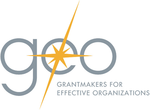
The Learning Conference 2011
June 6–7, 2011
Baltimore, MD
Short Talk — The Substance of Story
Session description
Storytelling is simultaneously the favorite and most-hated buzzword of the moment in philanthropy. We tell stories, but then what? Do we actually use the stories we tell and hear? How? Are stories part of philanthropy’s core business, or peripheral? Why? Are some stories worth the telling, while others should be ignored? How do we know the difference? This thought-provoking talk by Melanie Moore will explore the inherent value of storytelling for advancing philanthropic goals, critique the ways we currently use and misuse stories in our work presently, and suggest a rigorous approach to storytelling for both story creators and story “consumers.”
Participant learning goals
• Learn the value of narrative and storytelling for developing an understanding of the impact of philanthropic initiatives.
• Learn how to differentiate anecdotes from systematic qualitative research that produces new knowledge.
• Learn strategies for listening to and interacting with stories emerging from your work.
Intended learning level
Activation — exposure to new ideas you maybe haven’t heard before
Speakers
![Melanie Moore, See Change, Inc. [photo]](https://5d67d7d2fab6aa2c003d-a12b070af57c9bbc32c5a41a66298b76.ssl.cf1.rackcdn.com/16/profile_189383bde507d439061272a4cede60ba.png)
Melanie Moore, See Change, Inc.
Web site
Speaker Biography
Melanie Moore specializes in designing innovative evaluation approaches for nonprofit organizations, intermediary organizations, foundations and public agencies. With a doctorate in child and adolescent development from the Stanford School of Education, her areas of content expertise include leadership development, place-based community change initiatives and youth development. In 2005, Moore founded See Change, Inc., an evaluation and strategic consulting firm with the goal of improving critical thinking in organizations working to make social change. See Change combines traditional research methods with new evaluation methodologies, including the use of videography, digital journaling and social network analysis.